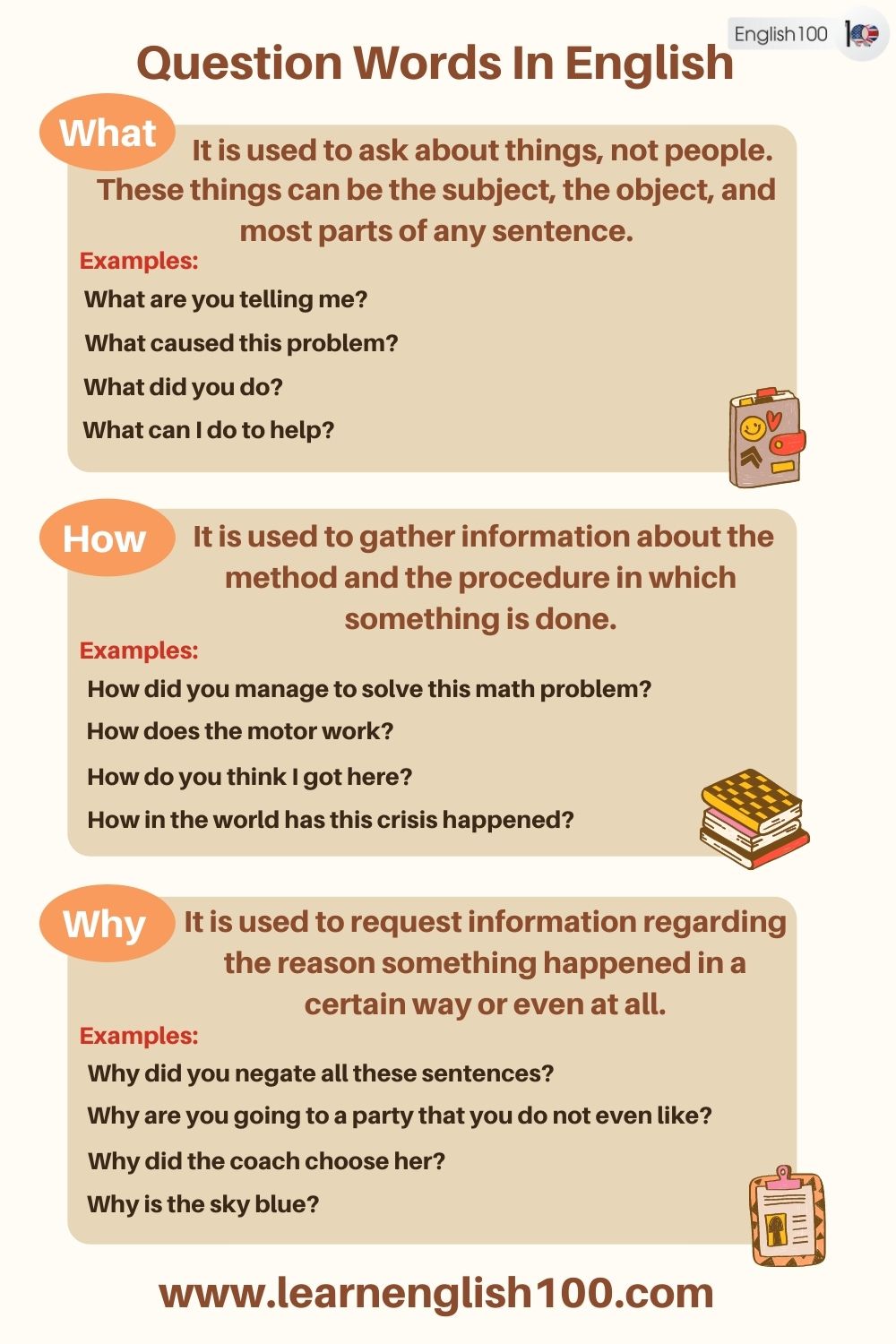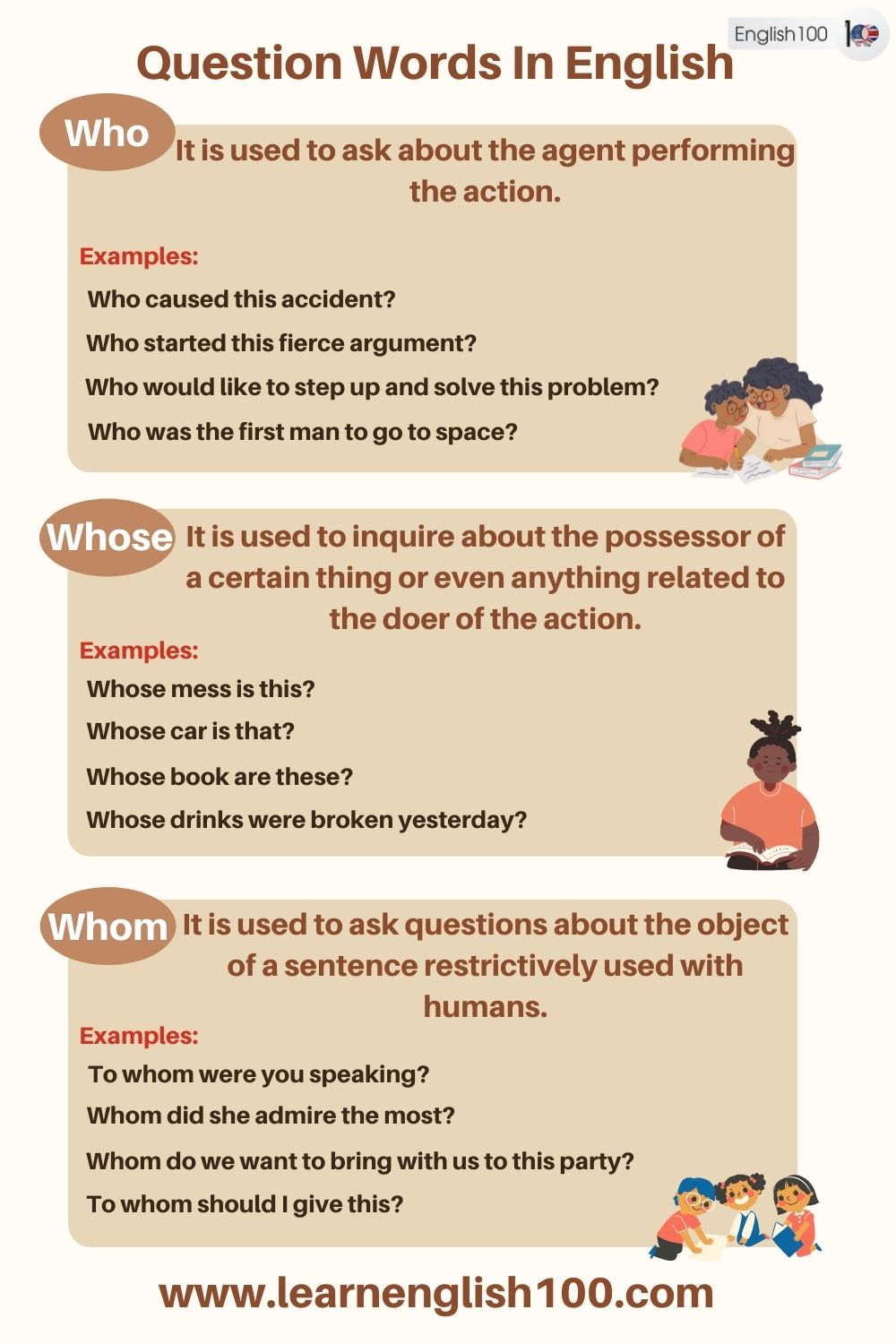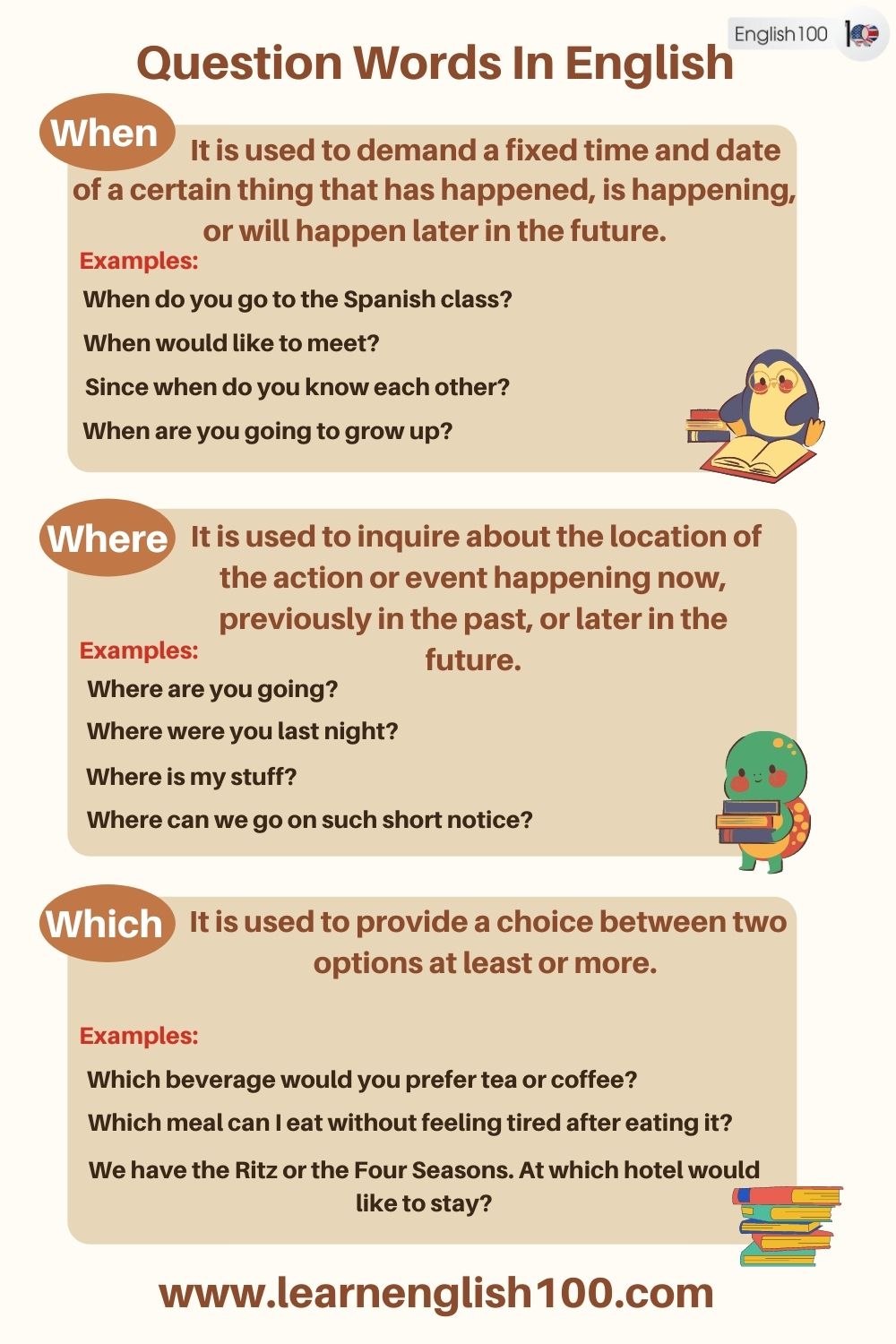


Question Words in English!
Question words, also known as interrogative words or wh-words, are an essential part of the English language. They are used to ask questions, gather information, and seek clarification. Understanding the various question words and their functions is crucial for effective communication. In this article, we’ll explore the most common question words in English and how to use them to construct meaningful questions.
Wh-words
What
When
Where
Who
Whom
Whose
Why
Which
How
Despite the fact that using these words is the primary major way of asking questions, there are other ways to ask the question without any change to any noun, verb, pronoun, or any addition to the vocabulary. It’s the tone of your speech that will denote that you are asking a question and not giving a statement nevertheless you are using the same structure of statements.
For example, in writing it will look like this:
You are using that machine?
You might be able to know that the person is asking, but even if you could not tell, the question mark will guide you toward the correct answer. In the previous example, the speaker is wondering if the addressee is in fact using this machine at all? Is this usage a regular event or is this a separate incident? All of this can be understood if you use the correct tone.
Now Let’s dive into a more detailed description of question words
What
What = it is used to ask about things, not people.
These things can be the subject, the object, and most parts of any sentence.
Examples:
What are you telling me?
In this case, the speaker is asking about the object of the sentence.
What caused this problem?
In this case, the speaker knows about the object “the problem”, and he is questioning the listener or listeners about the cause which functions as the subject of the sentence.
What did you do?
In this case, we are asking for information regarding the nature of the action itself. This question is neither about the subject nor about the object, but it is restrictively about the action.
What can I do to help?
In this case, we are demanding information again about the verb, but this time about a verb that has not happened yet, but is about to happen in the near future.
How
How = it is used to gather information about the method and the procedure in which something is done. In other words, it is used to illustrate the method by which something has been approached or achieved. The method can be any series of steps used to accomplish any event or result.
Examples:
How did you manage to solve this math problem?
How does the motor work?
How do you think I got here?
How in the world has this crisis happened?
How can we connect with God?
Note that how can be used in another way to offer suggestions. For instance, in this sentence, the speaker is not happy with the provided options, so he says: “How about we change this plan altogether?”
Why
Why = It is used to request information regarding the reason something happened in a certain way or even at all. Simply it is used to ask about the cause instigating the performed action.
Examples
Why did you negate all these sentences?
Why are you going to a party that you do not even like?
Why did the coach choose her?
Why are you using this substance instead of the usual one?
Why is the sky blue?
When
When = It is used to demand a fixed time and date of a certain thing that has happened, is happening, or will happen later in the future. In other words, we use “When” to ask about the timing of a specific action or event.
Examples
When do you go to the Spanish class?
When would like to meet?
Since when do you know each other?
When are you going to grow up?
When does the movie start?
Where
Where = It is used to inquire about the location of the action or event happening now, previously in the past, or later in the future. That means that “Where” is used to grasp information regarding the place.
Examples
Where is the wedding ceremony going to be held?
Where are you going?
Where were you last night?
Where can we go on such short notice?
Where is my stuff?
Which
Which = It is used to provide a choice between two options at least or more. The listener will have to answer by choosing either one of the choices, none of them, or possibly all of them, and sometimes everything and more.
Examples
Which beverage would you prefer tea or coffee?
We have the Ritz or the Four Seasons. At which hotel would like to stay?
Which meal can I eat without feeling tired after eating it?
Keeping in mind that we provide a bundle of choices, which one would you best prefer?
Who
Who = It is used to ask about the agent performing the action. It is used restrictively in relation to the agent of the verb and used solely with animate agents. Simply, it is used to acquire information about the doer of the action specifically if it is human.
Examples
Who caused this accident?
Who started this fierce argument?
Who would like to step up and solve this problem?
Who was the first man to go to space?
Whose
Whose = It is used to inquire about the possessor of a certain thing or even anything related to the doer of the action. Now, the action itself is not asked about, but rather it, “Whose”, demands information as to the relation of the result of the aforementioned activities to a certain person.
Whose mess is this?
Whose car is that?
Whose book are these?
Whose drinks were broken yesterday?
Whom = It is used to ask questions about the object of a sentence restrictively used with humans.
A very famous example is “To Whom it may concern.”
Example Questions
To whom were you speaking?
Whom did she admire the most?
Whom do we want to bring with us to this party?
To whom should I give this?
Question words are incredibly important for English learners to master. They can be used to ask meaningful questions and effectively communicate in a wide range of settings, from casual conversation to formal business settings. 1
Important notes
Note that it is very easy to differentiate between who and whom. If the answer to the question is the subject of the sentence then the question word should be who. If the answer to the question is the object of the sentence, then you have to use whom. However, the word whom is considered somewhat old and outdated which is why you will see who in its place most of the time. In fact, you’ll even feel that those examples are wrong and weird to use “whom”, but they are absolutely correct and it’s against the rules to use “who” in the aforementioned examples.
Note there is also a common misconception and mistake where people use whose instead of who’s. Now both sound exactly the same. But whose refers to the possession of something, while who’s is a construction of two words, who and is, and they are used to ask about the agent if it was singular and a third person too.
You should also pay attention to the fact that all the question words above can be used as relative pronouns to connect two sentences. So their use is not restricted to asking questions only. Their role in the declarative sentence is exactly the same as it is in the interrogative sentence. For example, what replaces a noun in the question and in the declarative sentence whether that noun was an object or a subject.
There are so many question words in any foreign language, for example, qui, que, and many more in French. Also, these latter question words may even function as a preposition in French.
Note that prepositions are usually dropped before common question words, but that is not a strict rule that is prohibiting speakers from breaking it. Usually, only a beginner would use prepositions extensively before common question words.
To avoid looking like a beginner, don’t use many prepositions before the usual question words. Now, question forming, in general, can be a tough task, but if you have a favorite book containing a story that you love you can enjoy forming questions that relates the story through a series of questions.
Also, don’t be intimidated by the name interrogative pronouns since simply it is the formal name of question words. Now without the usual question words, you can use dummy do and its inflections, “did and does” to form another type of question which is the yes-no question.
For example, Did you do that? its answer will be “Yes I did. / No, I did not.” From that simple example, you might be able to tell that the type of response required will depend on the type of the questions.
FAQ
What are question words used for?
Asking Questions: The primary role of question words is to form questions. They introduce inquiries to gather information, seek clarification, or initiate discussions. Question words help transform statements into questions.
Seeking Information: Question words are used to obtain specific information about a person, place, thing, action, time, reason, or manner. They allow individuals to inquire about various aspects of a subject.
Clarification: Question words are employed to seek clarification when something is unclear or when more details are needed. They prompt the respondent to provide additional information.
Making Choices: “Which” is a question word used to present choices or options and inquire about a preference or selection. It helps individuals make decisions by narrowing down possibilities.
Determining Reasons: Question words like “why” are used to inquire about reasons, explanations, or motivations behind actions or events. They help uncover the underlying causes.
Quantifying: Question words like “how many” and “how much” are used to ask about quantities or amounts. They are essential for obtaining numerical information.
Establishing Time: Question words such as “when” and “how long” are used to inquire about time-related details, including specific moments, durations, or schedules.
Identifying People: Question words like “who” and “whom” are used to inquire about individuals or groups of people. They help determine identities and roles.
Ownership and Possession: “Whose” is a question word used to ask about possession or ownership. It helps identify the owner of an object.
Describing Manner: “How” is a versatile question word used to inquire about the manner in which something is done or the condition or state of something.
How do you identify question words?
Identifying question words, also known as interrogative words or wh-words, is relatively straightforward in English. These words are used to introduce questions and seek information. To identify question words, look for the following characteristics:
They Begin Questions: Question words typically appear at the beginning of a question sentence or phrase. They introduce the question and signal that information is being sought.
They Start with Wh- or How: Most question words in English start with the letters “wh” or the word “how.” These include words like “what,” “where,” “when,” “who,” “whom,” “whose,” “which,” “why,” and “how.”
They Are Used to Ask About Specific Information: Question words are used to inquire about specific details, such as the identity of a person, the location of something, the reason for an action, or the manner in which something is done.
To conclude, question words are indispensable tools for seeking information and engaging in conversations in English. By mastering these question words and understanding their specific uses, you’ll be better equipped to ask questions effectively, elicit information, and engage in meaningful dialogues. Whether you’re learning English as a second language or seeking to refine your communication skills, these question words are your gateway to effective and precise questioning.
References:
- English, L., & English, L. (2023, October 1). Question Words in English Learning: How to ask Better Questions in Service-Based Businesses. Learn Laugh Speak | Learn Laugh Speak.
